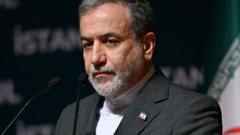Recent actions by the Trump administration suggest a significant shift in U.S. foreign policy towards Syria, as sanctions are lifted and new expectations are set for the incoming government.
# Shift in U.S. Policy Towards Syria: The Implications Ahead

# Shift in U.S. Policy Towards Syria: The Implications Ahead
The U.S. government signals a renewed engagement with Syria, easing sanctions amidst a changing political landscape.
In a surprising policy reversal, President Trump announced earlier this week the suspension of most economic sanctions on Syria, a move intended as a goodwill gesture aimed at revitalizing the war-torn country. This change comes after a coalition of rebel forces successfully ousted President Bashar al-Assad, leaving Syria in a precarious economic situation, with more than 90% of the population reportedly living in poverty according to United Nations assessments.
During a May visit to Saudi Arabia, President Trump indicated that the United States would take a step back from its previous isolationist stance towards Syria. This development has been met with enthusiasm among Syrians eager for economic recovery and stability in their lives. On Monday, Trump formalized this approach by signing an executive order that removes many sanctions that have long crippled the Syrian economy. However, some sanctions will remain in place, as they require Congressional approval for repeal.
This economic thaw signals to other nations and financial institutions that the U.S. will not impose penalties for resuming trade and investment in Syria, potentially aiding the new government led by President Ahmed al-Shara. Shara, who played a pivotal role in dismantling the Assad regime, now faces the daunting task of rebuilding a fractured nation amidst concerns of Islamist governance.
As the Trump administration alters its strategy, U.S. officials have emphasized that while they will not dictate Syria's internal affairs, they expect the new government to address key issues of regional security and manage relations with neighboring countries effectively. These expectations appear to be framed not as conditions for aid, but rather as goals for the new administration to strive towards, indicating a more collaborative approach moving forward.
As Syria begins this new chapter, the ramifications of U.S. policy will play a significant role in shaping the nation’s recovery and its future engagement with the global community.




















